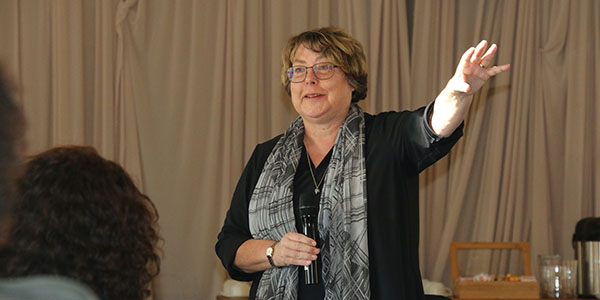Wits' Path to Gender Equity: Insights from Bath Spa University's Vice-Chancellor
- Pascalia Munyewende
Wits University's TEEO invited university transformation committees to discuss gender equity with Bath Spa University's Vice-Chancellor, Professor Sue Rigby.

In pursuit of gender equity and inclusivity in academia, the Transformation and Employment Equity Office (TEEO) at Wits University extended a warm invitation to several university transformation committees to an important discussion with Professor Sue Rigby, the Vice-Chancellor of Bath Spa University.
The purpose of her visit was to engage in a discussion that would lay the foundation for a comprehensive gender equity strategy, policy, and plan for Wits.
Under the welcoming roof of the Wits Club, over 30 participants came together to be part of this crucial discussion. Among them were key Wits figures including Dr Bernadette Johnson, the Director of the TEEO, Wits Chancellor Dr Judy Dlamini, and Maria Wanyane, the Manager of Social Justice and Diversity in the TEEO.
To ease into the discussion, Charlene Beukes-Mabaso eloquently shared her perspectives on gender equity within Wits while Dr Anlia Pretorius shed light on the challenges associated with disability rights and practices faced by Wits students.
As the dialogue unfolded, Johnson and Wanyane expressed their heartfelt appreciation for the valuable insights from the conversation. They also underscored the strides made by Wits in addressing pressing transformational issues, spanning topics such as gender equity, bullying, micro aggression, access to campus, race, transitioning, language, breastfeeding, disability, renaming of buildings, institutional culture, and diversifying the academy.
The highlight of the event arrived with the engaging talk by Professor Sue Rigby, a trailblazer in her own right. Rigby shared insights into her approach to addressing gender equity at Bath Spa University.
She illustrated her commitment to gender equity by sharing personal anecdotes, highlighting the challenges she faced as a woman in academia. Rigby attended a rural school in the 50s and remembers being laughed off about her career choice to be a palaeontologist and being propositioned by men just because she was one of the few women in class when she was at University.
Every lecturer and academic in those days was a man, “…it would be true to say that every woman was propositioned by at least half of the Faculty during that time. But it was 1980 and people found it odd that my husband also allowed me to go out of the home to work instead of taking care of the children.”
This transparency about her own experiences served to raise awareness and normalise discussions about gender equity in the room. As a woman in a prominent leadership role, Rigby serves as a role model, demonstrating that women can excel in leadership positions in academia. Her position as Vice-Chancellor is a testament to her commitment to advancing gender equity.
In her recommendations for a gender equity strategy at Wits University:
- Rigby emphasized that addressing gender equity requires structural changes. She advocated for a strategic, top-down approach, where support for gender equity initiatives should come from the highest levels of the University.
- She suggested that the experience of being a woman with children could be seen as an asset in leadership roles. She pointed out that skills such as self-management, self-control, understanding, empathy, and leadership can be cultivated through parenting, making it a valuable experience in the context of leadership.
Moving forward together
The Chancellor of Wits also shared her perspectives and experiences on the issue of a gender equity strategy, policy, and plan for Wits. In her presentation, Dlamini echoed some of Rigby's academic experiences, indicating a commonality in the challenges they faced as women in academic and leadership roles.

This understanding of gender-related challenges motivated and pushed Dlamini to establish the Female Academic Leadership Fellowship (FALF) programme which aligns with the broader goal of promoting gender equity and inclusivity in academic and management leadership positions.
Her commitment to addressing the underrepresentation of women, particularly African and Coloured South African women, in leadership roles was appreciated by FALF fellows who were also present in the discussion. Dlamini's emphasis on considering both race and gender in academic rankings and leadership positions mirrored the need for a comprehensive approach to diversity and equity, aligning with the broader conversation about intersectionality that Rigby touched upon.
Moreover, she recognised a strong pipeline of African females at associate and lecturer levels underscoring the importance of acknowledging and nurturing talent at various stages of academic and leadership development. This approach resonates with Rigby's emphasis on recognising diverse experiences and potential in leadership roles. Dlamini's belief that individuals in leadership positions have a responsibility to make a change aligned with Rigby's call for structural solutions and top-down support.
“I come from a social group that is in the minority when it comes to leadership, I've always believed that no matter what type of leadership position you have, whether it has executive responsibility or not, you do have a responsibility to make a change, especially in our country because of where we find ourselves and how women are still quite behind when it comes to any position of leadership, in any sector, for that matter,” Dlamini reminisced.
As the event drew to a close, attendees expressed gratitude for the platform that allowed them to delve into these pivotal issues of gender equity in the University. The discussion successfully brought to the fore a comprehensive array of concerns encompassing gender, disability, race, class, access, breastfeeding on campus, staff transitioning, and the imperative to approach these challenges within an African context and avoid using a Western discourse to solve the said challenges.
In the end, the consensus was, "Let us find a way to move forward, but when you move forward, you have to move forward together."

